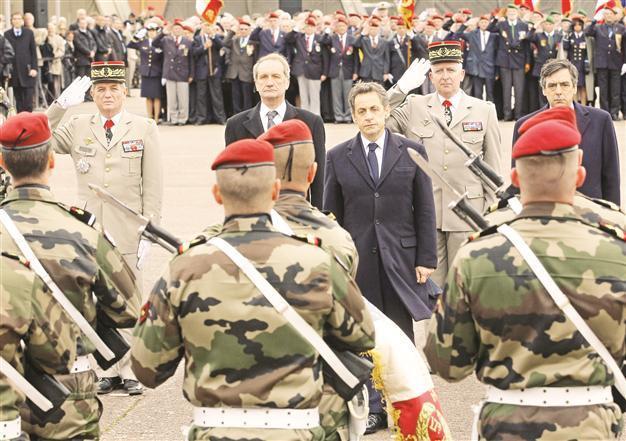France questions intel’s role over Toulouse killer
PARIS

French President Nicolas Sarkozy (C) flanked by Defense Minster Gerard Longuet (2ndL) and Prime Minister Francois Fillon (R), faces soldiers as he takes part in a ceremony in homage to 3 French paratroopers who were killed by Merah. Latest polls show that Sarkozy is narrowing the gap with his Socialist rival after deadly shootings. AFP photo
People across France are asking whether intelligence failures were to blame for the recent killing spree of a self-described al-Qaeda sympathizer amid a rapidly tightening presidential race.Politicians and local media have asked how French intelligence officers failed to stop the killing spree earlier, given that security officers had been aware of Mohammed Merah and even been in recent contact with him.
Prime Minister François Fillon rejected accusations on March 23 that his government could have prevented the murders by the gunman, who was supposedly being watched by intelligence services.
Fillon said security officials knew Merah, who died in a hail of police bullets March 22, was a radical Islamist who had visited Afghanistan and Pakistan but insisted there was no reason to suspect he was planning an attack.
“The fact of belonging to a Salafi [ultraconservative Muslim] organization is not unto itself a crime. We must not mix religious fundamentalism and terrorism, even if naturally we well know the links that unite the two,” Fillon said. “We don’t have the right in a country like ours to permanently monitor without judicial authorization someone who hasn’t committed an offense. ... We live in a state of law.”
Merah had been asked by intelligence officials in November 2011 to explain his visit to Afghanistan and Pakistan and had shown them photographs to prove he had been a tourist, the interior minister said.
Merah told negotiators he killed seven people to avenge the deaths of Palestinian children and to protest the French army’s involvement in Afghanistan, as well as France’s law against the Islamic face veil. He had been also on a U.S. no-fly list since 2010.
Fillon said President Nicolas Sarkozy’s government was working on new anti-terrorism legislation that would be drafted within two weeks and that the government would consult with leaders of the Senate, which is controlled by the opposition. François Hollande, the Socialist challenger to Sarkozy, referred to reports of possible failings in the surveillance of Merah at a rally late March 22. “Questions will have to be [posed],” he said.
Merah’s killings had interrupted the campaign for France’s presidential vote, but Sarkozy has resumed his re-election bid hoping his reputation as a crime fighter will carry the day. He has been trailing Hollande in opinion polls for months, but the murders and the killer’s violent end have stirred up the campaign just as he was narrowing the gap.
Analysts say Sarkozy has capitalized on his role as the incumbent during the crisis, portraying himself as a statesman, and his right-leaning rhetoric on immigration and law and order has appeared topical, even if it raises the hackles of the left. The first opinion poll conducted since Merah committed his third attack at a Jewish school in Toulouse showed Sarkozy surging past Hollande in the April 22 first round, even though it predicted Hollande would still win a May 6 runoff. A second poll showed Sarkozy had also trimmed Hollande’s lead in the second round and that voters considered him more credible on security and immigration issues, which are likely to increasingly come into focus in the campaign.
Compiled from AFP, AP and Reuters stories by the Daily News
















